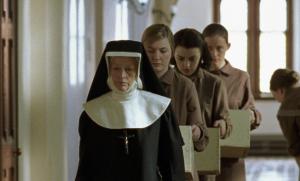|
Issue Date: August 15, 2003 Shock and inspiration 'The Magdalene Sisters' takes a harsh look at a bygone institution; 'Seabiscuit' offers a tonic tale of hope By JOSEPH CUNNEEN The trouble with The Magdalene Sisters, Peter Mullan’s powerful new film about slave labor in Irish convent laundries in the 1960s, is that it will most likely go unseen by those still in denial about repressive Catholic attitudes toward sexuality. Others should easily find connections between the movie and the sexual abuse scandals (and their cover-up) in the United States. In both cases what is most depressing is (was?) the broad cultural acceptance of an outlook that saw extramarital sex as the greatest (if not the only) sin, one that couldn’t even be mentioned. Mullan says he based much of his story on a BBC documentary and also interviewed former inmates of the laundries, who were often called Magdalenes, since over the years the great saint had mistakenly been considered a repentant sexual sinner. The young women in the Irish laundries were imprisoned with their families’ consent because they had had an illegitimate child or seemed ready to “act out” sexually. The movie mainly follows three victims of this inhuman system. In the opening sequence, Margaret (Anne-Marie Duff) is raped during a wedding party, and is either not believed or made the scapegoat for the man’s violence. Bernadette (Nora-Jane Noone) is incarcerated because she flirts with boys.
Mullan gets strong performances from his Magdalenes, and an especially scary one from Sister Bridget (Geraldine McEwan), the head nun, a sadist who becomes teary-eyed when “The Bells of Saint Mary’s” is shown at the convent. Sister Bridget makes her charges line up naked for morning calisthenics and sarcastically evaluates their physical characteristics. Eileen Walsh makes the simple-minded Crispina, who has been secretly abused by a priest, a nightmarish victim. Margaret puts nettles in the priest’s laundry, which leads to the film’s most hallucinatory scene: In the middle of Mass, the priest wrenches off his vestments, and then the rest of his clothes, while Crispina screams out again and again, “He is not a man of God!” “The Magdalene Sisters” is a one-note story that would have been more effective if it had also included some parents protesting the system or one of the nuns showing kindness to the young women. But if Mullan is angry, he surely has a right to be, and he uses his craft to dramatize the grim realities of the shocking situation. Although the film includes outrageous elements, there is subtlety in the way it contrasts the dark interiors of the convent with the lush green scenery just beyond its door. In order to make his harsh story more palatable, Mullan frees his three principal Magdalenes near the end, leaving the movie with unanswered questions. The brother of Patricia (Dorothy Duffy) suddenly arrives with documents that make it possible for her to leave, and she understandably asks, “What took you so long?” The audience cheers as Bernadette and Margaret steal Sister Bridget’s keys and storm their way out of the convent. But when they arrive in fear at the nearby village, they are immediately given help at the first house they enter: Was the system supported by the surrounding culture or wasn’t it? Nevertheless, though some will call “The Magdalene Sisters”
anti-Catholic, it remains a powerful criticism of the abuse of power and
authority in the name of the church. ( After such righteously inflicted malice, Seabiscuit arrives as an exciting tonic. Gary Ross’s adaptation of Laura Hillenbrand’s wildly popular historical biography promises to be summer’s biggest and most uplifting hit. The movie is a celebration of America, with special emphasis on the recovery of hope under Roosevelt in the 1930s. Solemnly narrated by David McCullough (who performed a similar service for Ken Burns’ “The Civil War”), the movie makes fine use of archival photography and John Schwartzman’s cameras convey the sense of personal participation in Seabiscuit’s climactic races against the previously unchallenged War Admiral. Jeff Bridges is fine as Charles Howard, a wealthy Buick salesman whose life fell apart when his son was killed in an automobile accident. It is Howard who announces the film’s theme: “Sometimes all somebody needs is a second chance.” Seabiscuit, the stunted, ill-tempered horse Howard acquires almost by accident, becomes the instrument of such a chance for himself and his two chief collaborators, jockey Red Pollard (Tobey Maguire) and trainer Tom Smith (Chris Cooper). Pollard is abandoned by his parents when they become destitute and endures the hardships of the south-of-the-border racing world. Best of all is Cooper, who manages to suggest the inner wisdom of the Old West with just a few lines of dialogue and amazingly subtle facial expression. “Seabiscuit” strikes a populist note when Howard asks for a one-on-one race between his horse and Triple Crown winner, War Admiral, described by his plutocrat owner as “a superior horse with superior breeding.” Ross emphasizes the vast public involvement in the race via radio, itself a reflection of a changing culture. The movie is successful in conveying the sense that Seabiscuit is an underdog we all would root for, a mythical figure that could revive national hope at a time of crisis.
Joseph Cunneen, NCR’s regular movie reviewer, can be reached via e-mail at SCUNN24219@aol.com His book Robert Bresson: A Spiritual Style in Film has just been published by Continuum. National Catholic Reporter, August 15, 2003 |
